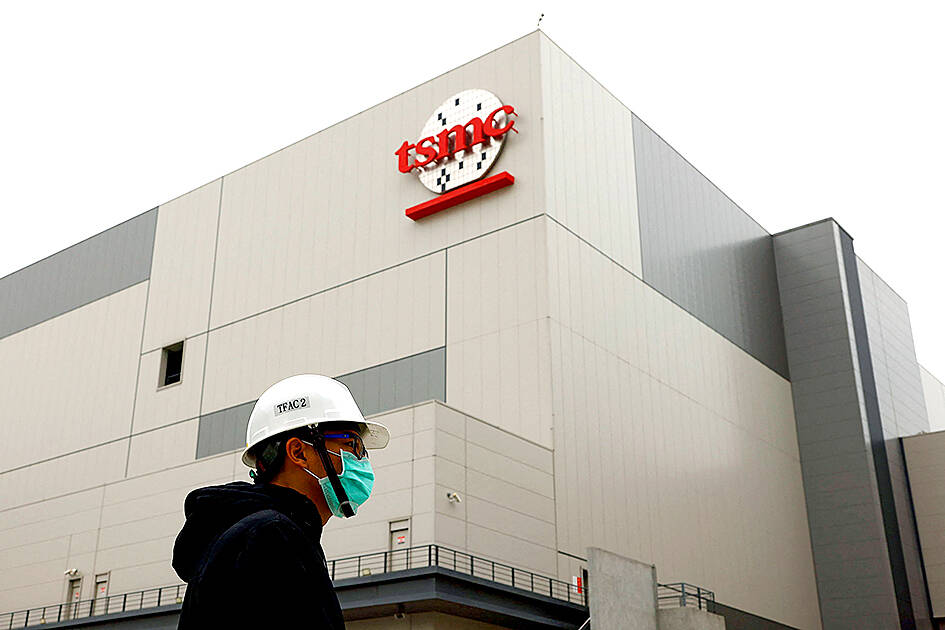The administration of the Central Taiwan Science Park yesterday said it has received approval from the Taichung City Government to go ahead with its second-phase expansion, allowing Taiwan Semiconductor Manufacturing Co (TSMC, 台積電) to begin the construction of a new 2-nanometer fab in June next year.
The expansion plan has been under multiple reviews over one-and-a-half years as the city government and Taichung residents worried that heavy consumption of water and electricity during the chip manufacturing process could pose a risk to supplies in the region.
With tailor-made supply plans under preparation, Taiwan Water Corp (台水) and Taiwan Power Co (台電) have promised that TSMC’s new factory would not lead to insufficient supply of water and electricity when it starts operations during a meeting yesterday with the officials from the Taichung Urban Development Bureau.

Photo: Ann Wang, Reuters
As construction of the fab has been postponed multiple times due to city government reviews, the administration said it would speed up its efforts to clear the final hurdle at the Ministry of the Interior, a statement released by the administration said.
The administration’s goal is to complete all required procedures by the end of this year to facilitate land expropriation. The administration expects to hand over the land to TSMC by the end of June next year, the statement said.
The second-phase expansion is crucial for the nation’s semiconductor development as TSMC is to introduce more businesses in its supply chain to the region, the administration said.
The project is expected to generate NT$485.7 billion (US$15.25 billion) in production value a year and create 4,500 new jobs upon completion, it said.
TSMC, the world’s largest contract chipmaker which counts Nvidia Corp and Apple Inc as its key customers, is also building a 2-nanometer fab, dubbed Fab 20, in Hsinchu, with the aim of starting volume production in 2025.
The firm said its 2-nanometer technology would be the world’s first and most advanced when it is introduced in two years.
TSMC is adding a second 2-nanometer fab as the advanced technology has received strong customer interest.
The 2-nanometer technology would mainly be used for chips for smartphones and high-performance computing devices such as servers, TSMC said.

GROWING OWINGS: While Luxembourg and China swapped the top three spots, the US continued to be the largest exposure for Taiwan for the 41st consecutive quarter The US remained the largest debtor nation to Taiwan’s banking sector for the 41st consecutive quarter at the end of September, after local banks’ exposure to the US market rose more than 2 percent from three months earlier, the central bank said. Exposure to the US increased to US$198.896 billion, up US$4.026 billion, or 2.07 percent, from US$194.87 billion in the previous quarter, data released by the central bank showed on Friday. Of the increase, about US$1.4 billion came from banks’ investments in securitized products and interbank loans in the US, while another US$2.6 billion stemmed from trust assets, including mutual funds,

AI TALENT: No financial details were released about the deal, in which top Groq executives, including its CEO, would join Nvidia to help advance the technology Nvidia Corp has agreed to a licensing deal with artificial intelligence (AI) start-up Groq, furthering its investments in companies connected to the AI boom and gaining the right to add a new type of technology to its products. The world’s largest publicly traded company has paid for the right to use Groq’s technology and is to integrate its chip design into future products. Some of the start-up’s executives are leaving to join Nvidia to help with that effort, the companies said. Groq would continue as an independent company with a new chief executive, it said on Wednesday in a post on its Web

Even as the US is embarked on a bitter rivalry with China over the deployment of artificial intelligence (AI), Chinese technology is quietly making inroads into the US market. Despite considerable geopolitical tensions, Chinese open-source AI models are winning over a growing number of programmers and companies in the US. These are different from the closed generative AI models that have become household names — ChatGPT-maker OpenAI or Google’s Gemini — whose inner workings are fiercely protected. In contrast, “open” models offered by many Chinese rivals, from Alibaba (阿里巴巴) to DeepSeek (深度求索), allow programmers to customize parts of the software to suit their

JOINT EFFORTS: MediaTek would partner with Denso to develop custom chips to support the car-part specialist company’s driver-assist systems in an expanding market MediaTek Inc (聯發科), the world’s largest mobile phone chip designer, yesterday said it is working closely with Japan’s Denso Corp to build a custom automotive system-on-chip (SoC) solution tailored for advanced driver-assistance systems and cockpit systems, adding another customer to its new application-specific IC (ASIC) business. This effort merges Denso’s automotive-grade safety expertise and deep vehicle integration with MediaTek’s technologies cultivated through the development of Media- Tek’s Dimensity AX, leveraging efficient, high-performance SoCs and artificial intelligence (AI) capabilities to offer a scalable, production-ready platform for next-generation driver assistance, the company said in a statement yesterday. “Through this collaboration, we are bringing two